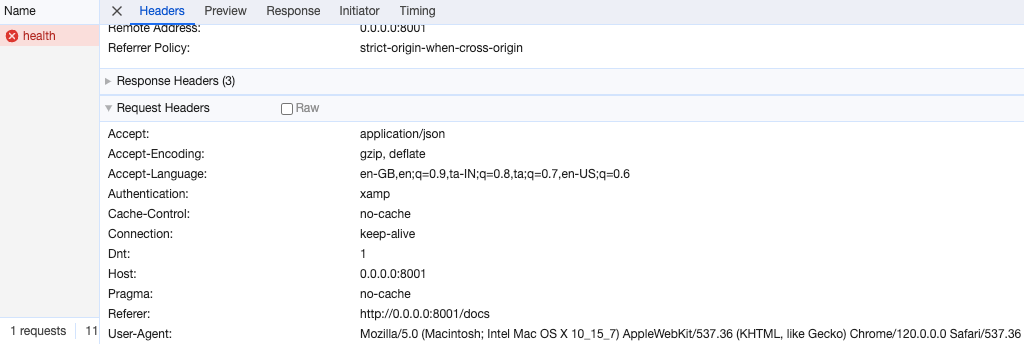Add Auth Layer to Your FastAPIs
Our whole backend now runs on FastAPI. It would be undermining to say I’d fallen in love with it, but a better word is, “Dear FastAPI, you’ve dearly replaced Flask.”
Contrary to The Zen of Python(There should be one— and preferably only one— obvious way to do it), we often encounter libraries that don’t necessarily follow this rule or at least make us think twice before choosing one way or another.
The same happens when you add an Auth layer for your FastAPI and APIs.
When it was time to implement an auth layer, we had several options.
- Write a middleware
- Write a custom Router
- Use ApiAuth Header
Looking back, the answer should’ve been relatively straightforward, only that it was not.
To give you some context, FastAPI was new for my team and me. Over the last 8 months, we have become comfortable with certain features over others. One such thing was middleware.
The team decided that was easier since we already had a few working middlewares 🔗.
Auth Layer with FastAPI middleware
Here is a simplified version of FastAPI middleware that reads the Authorization header and fetches the user. If it fails to do either, it will return a 401.
class AuthMiddleware:
def __init__(self, app: ASGIApp) -> None:
self.app = app
async def __call__(self, scope, receive, send) -> None:
if scope["type"] != "http" or scope.get("path") in [
"/docs",
]:
return await self.app(scope, receive, send)
headers = dict(scope.get("headers", []))
authorization_header = headers.get("Authorization")
if authorization_header:
request.state.user = await fetch_user(
authorization_header,
)
await self.app(scope, receive, send)
return
response = Response("Unauthorized", status_code=401)
await response(scope, receive, send)
from fastapi import APIRouter, FastAPI
app = FastAPI()
app.add_middleware(AuthMiddleware)
@app.get(
"/",
summary="Get Health Status",
)
def get_health_status():
return "Ok"There are a few things to note here.
- The 1st version of this code was complicated, resulting in Runtime Stream Error 🔗 when coupled with sentry.
- We haven’t extended our middleware from a pre-defined class; that’s a pattern we found most FastAPI middleware follow.
- When we deployed it, the OpenAPI docs could not set the auth header.
The 3rd point was more concerning for us, given we are a team of 8+ developers constantly developing, testing, and deploying APIs, and our docs are the first point of contact for new APIs

FastAPI Depends
The familiar concept for us was Depends. adding a dependency on the router level. Infact, FastAPI recommends it.
For many scenarios, you can handle security (authorization, authentication, etc.) with dependencies, using
Depends()
from fastapi import Depends, Security
def auth_header(Authentication: str = Header()):
if auth != CONST_AUTH_KEY:
raise HTTPException(
status_code=HTTP_401_UNAUTHORIZED,
detail="Invalid authentication credentials",
headers={"WWW-Authenticate": "Bearer"},
)
router = APIRouter(
prefix="/v1",
tags=["API v1"],
dependencies=[Depends(auth_header)],
)
@router.get(
"/health",
summary="Get Health Status",
)
def get_health_status():
return "Ok"
app.include_router(router)That would seem to work like a charm… until… you hit the API
Despite passing the Authorization header from the UI, you can see the field is missing an error.

If you inspect the network call, you can see that the specified header will be dropped from

FastAPI Security
Unfortunately, FastAPI security also has a similar effect with Header for the same reason that auth headers are dropped from the request
from fastapi import Security
...
router = APIRouter(
prefix="/v1",
tags=["API v1"],
dependencies=[Security(auth_header)],
)
What a bummer! Technically, both these methods should work. Unfortunately, it doesn’t. Don’t worry. We haven’t run out of options yet.
We have a couple more, and both works.
FastAPI HttpBearer
Unlike our previous method, where auth_header a mere Header. In this method, we will be passing an HTTPBearer object wrapped in Security an object to auth_header dependency does the trick.
from fastapi.security import HTTPBearer
CONST_AUTH_KEY='temp-key'
def auth_header(Authentication: str = Security(HTTPBearer())):
if Authentication != CONST_AUTH_KEY:
raise HTTPException(
status_code=401,
detail="Invalid authentication credentials",
)
router = APIRouter(
prefix="/v1",
tags=["API v1"],
dependencies=[Depends(auth_header)],
)FastAPI APIKeyHeader
In this method, we will be splitting the authentication logs into two parts
- Check whether the right key format is passed on the request
Header - Use the Auth Middleware from method 1 to ensure that the right key is passed
from fastapi.security import APIKeyHeader
auth_header = APIKeyHeader(name="Authorization", auto_error=True)
router = APIRouter(
prefix="/v1",
tags=["API v1"],
dependencies=[Security(auth_header)],
)
app.add_middleware(AuthMiddleware)